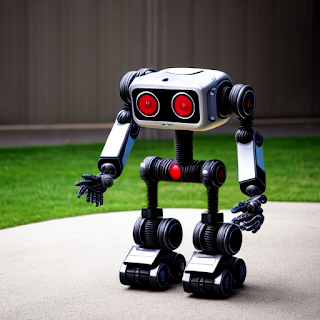What is the functioning principle of robots?
The advancements in robots have revolutionized multiple fields, raising their operational standards. However, the excellence of these robotic machines begs the question - what's behind it all? This write-up delves into the intriguing realm of robotics and explores its inner workings.
Discovering Robotics
Robotic technology involves the creation of independent or minimally dependent robots. Their applications in various aspects of life are diverse, ranging from speeding up production to facilitating household cleaning routines. The significance attributed to these machines can hardly be overstated within today's global landscape!
Shall we explore robotics further and get to the bottom of it?
Understanding and feeling.
Robots utilize a range of sensors to interact with their environment and gather data, such as cameras, infrared sensors, ultrasonic sensors or tactile ones.
In order to act intelligently and respond appropriately, robots acquire data from their surroundings. For example, a self-driving vehicle relies on sensor technology for detecting factors such as pedestrians, lights and obstacles during operation in the interest of maximizing safety and proficiency.
Managing and Selecting.
As a robot collects data, it processes the information and employs seamlessly integrated components to execute tasks.
By evaluating its surroundings, the robot's cognitive system processes and applies prior knowledge to determine appropriate actions such as grasping without obstacles or performing complex tasks while avoiding collisions.
Relocating objects.
Actuation is key to the mobility of robots. Actuators are integral components within robotic systems, empowering them to perform a diverse array of actions such as grasping objects, rotating or extending their limbs. The gamut encompasses an assortment motor types and servos!
Using their senses and moving with precision, robots are capable of performing multiple tasks. In industrial settings, they exhibit exceptional repeatable movement enabling efficiency in work processes.
Robots employed in various sectors.
Numerous industries are utilizing robots to improve their operations. The following examples illustrate this trend:
Healthcare.
Healthcare is harnessing the power of robots to enhance medical procedures, provide assistance to surgeons with intricate operations and simplify patient treatment. Furthermore, individuals who have undergone amputations are being aided by cutting-edge robotic prosthetics that facilitate movement once more.
Creating objects.
The utilization of robots has significantly enhanced manufacturing processes, by increasing efficiency through faster and more precise operations at a lower cost. Robot technology enables the successful completion of arduous tasks such as assembly and quality control checks whilst reducing human error, resulting in quicker delivery times without interruptions from people.
Agriculture.
Robotic technology is employed by farmers for efficient planting, harvesting, and monitoring of their crops. The robots possess advanced sensory tools that aid in decision-making based on gathered information. This approach enables farmers to complete more tasks in less time while cutting down expenditure costs on laborer wages significantly. Additionally, the use of robotic applications translates into decreased chemical usage when fertilizing or exterminating pests thereby promoting overall environmental health benefits as well.
To summarize,
Robots possess the capability to either work independently or with minimal human intervention. Their functionality has become increasingly sophisticated and beneficial across numerous domains such as healthcare, manufacturing, and agriculture. These machines rely on sensor technology to detect their surroundings, employ decision-making algorithms for dictating their next course of action based on gathered data, alongside motors that facilitate movement. Thus whenever one observes a robot functioning diligently in any setting, it warrants periodic reflections about its invaluable contributions towards humanity's welfare!



0 Comments